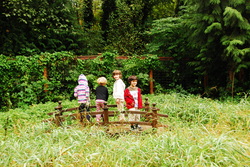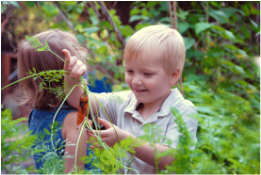MCH prides itself on having wonderful outdoor environments available for our students to explore and interact with. Our campus is nestled onto 5 acres of natural woodlands, wetlands, and forested hillsides.
Gardening
|
As part of our life sciences curricula, MCH has an active garden program based on the Montessori model of a child-directed, developmentally appropriate, individualized approach. Each MCH program (Infant/Toddler, Early Childhood, Elementary) provides children with direct access to gardening with the support and guidance of our Gardening Specialist. Several direct goals of gardening with children include nurturing independence, inspiring awe and wonder in the natural environment, and meeting several cognitive objectives such as an enriched vocabulary and taxonomy lending to a sense of where plants fit into the greater world.
|
|
Farming
|
MCH also maintains a small selection of livestock, including goats and egg-laying chickens and rabbits. The livestock pens are incorporated into our grounds with ample opportunities for the children to interact with the animals. Feeding for our animals is supplemented with food waste scraps from our classrooms and kitchen.
|
|
Wetland and Natural Environments

The Nature Trail is a community-created place of stewardship, discovery and connection to the natural world and an evolving space in which children experience a sense of belonging to our world and our community. Our Nature Trail is certified as a Natural Wildlife Habitat by the National Wildlife Foundation and as a Backyard Wildlife Habitat by the Washington Department of Fish and Wildlife. Thanks to the support of the MCH Parent Association, the 680 ft, fully-enclosed Nature Trail is a valuable part of our community.
In 2009, we received an ING Unsung Heroes Scholarship award. The award money was used to develop natural resource management curricula, looking at water and power usage on campus. The school purchased wetland and soil testing kits, solar education kits including solar ovens, and a power house kit, which students use on the protected wetlands on our campus.
In 2009, we received an ING Unsung Heroes Scholarship award. The award money was used to develop natural resource management curricula, looking at water and power usage on campus. The school purchased wetland and soil testing kits, solar education kits including solar ovens, and a power house kit, which students use on the protected wetlands on our campus.
Community
The Nature Trail is a touch point of community for MCH. The students provide leadership and have a vested interest in the Trail. The staff, parents, and extended families are intimately involved in the effort and the project will continue to span generations of students. The Mature Trail provides campus continuity and embodies the Montessori peace education mandate. MCH is part of a larger community and the Nature Trail enhances connections with that broader community.
The Nature Trail provides a low maintenance natural environment that has several divergent paths to explore and multi-level experiences. It offers a variety of motor activities for a broad range of community members. This trail is a place where the community DOES things! Dig, feed, move, build, reshape, plant, weed, harvest, explore.
Philosophy/Spirit
The Nature Trail is a journey, not a destination. It provides a sense of wonder of the natural world and a feeling of belonging to that world. The Trail is an evolving, dynamic ecosystem with a sense of history and purpose that invites the community to ponder what’s next. It facilitates community ritual, welcomes families and exemplifies our commitment to educating the whole child.
Space Interaction/Physicality
After five years of planning, digging, building, and planting, we have a 680 ft long trail that encompasses six different native planting zones. These zones include low maintenance flowering beds of annual & perennial grasses and wildflowers, Puget Basin forest understory, flowering forest understory, wild berries, a bio-swale with wetland grasses, and a sunny hillside stabilization section.
After replacing non-native plants with native ones, we use compost from our yard waste to help reduce the trail’s water dependence, and do not use pesticides or outside fertilizers.
After replacing non-native plants with native ones, we use compost from our yard waste to help reduce the trail’s water dependence, and do not use pesticides or outside fertilizers.
|
|
EducationThe Nature Trail is a living classroom and is an integral part of the educational experience. It provides both on path and off path opportunities to observe, discuss, and interact with a broad representation of nature. True to Montessori philosophy, it meets the student’s learning styles and sensory needs. It provides classrooms with specific stewardship responsibility. The nature trail facilitates independent, small group and large group learning scenarios.
|
The Nature Trail was a project that brought together our entire community – children, teachers, parents. Starting as an outdoor classroom dream by our teachers, we found an architect amongst our parent community to bring the dream to reality.
Community Contributions

Funds that help "grow" our garden are provided by the MCH Parent Association and the school, along with generous seed donations by Peaceful Valley Farm and Garden Supply and Baker Creek Heirloom Seeds. We've also benefited from a grant sponsored by Whole Foods and the Whole Kids Foundation.
|
Montessori Children's House
5003 218th Ave. NE Redmond, WA 98053 Phone: 425-868-7805 [email protected] For Records Requests, please reach out to [email protected]. |
Founded in 1987
|

